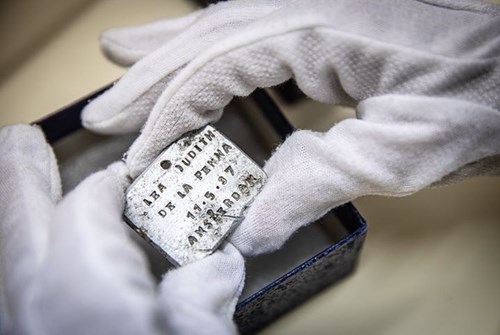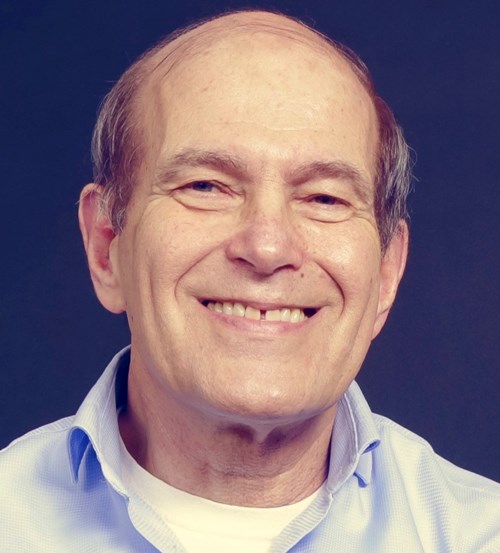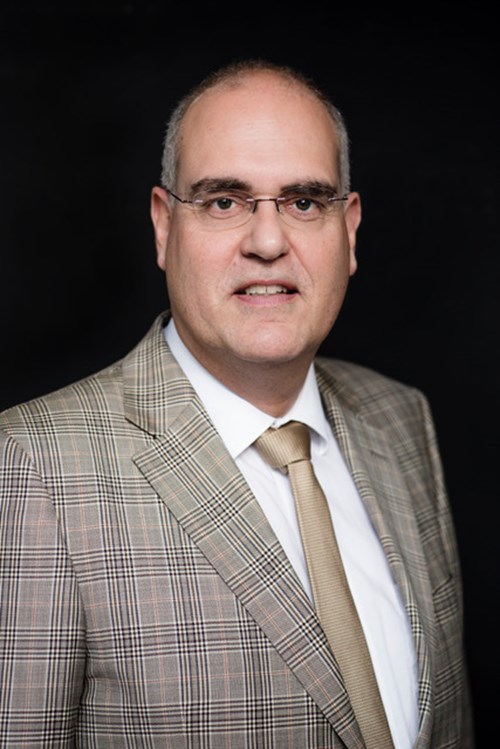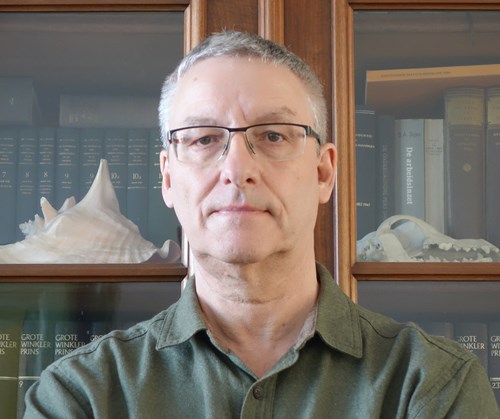Five intense stories
The Sjoa Foundation For Individual Insurance Claims has existed for twenty years. During this period, the Foundation has paid 8.5 million euros to over 14,000 people. The Foundation has so far processed more than 22,000 applications (97 per cent) and has obtained much valuable information. In ‘20 years Sjoa Foundation’ all parties involved are interviewed.
The interviews were published on the website of the Dutch Association of Insurers (in Dutch) and have been translated for this long read. Five different stories with one similar aspect: all five are very intense stories.
1. 
In the first part, Foundation’s chairman Ernst Numann tells about the history of the Foundation and concludes that justice has been done after all.
2.
In the second part, claimant Lea de la Penha tells about the “very emotional journey” that she and her family made to Poland.
3.
In the third interview, former general manager of CIDI Ronny Naftaniel looks back upon the agreement which was concluded in 1999 between the Central Jewish Board and the insurance companies.
4.
In the fourth interview Paul Metsemakers of insurer a.s.r. tells about ‘the harsh reality’.
5.
And finally, in the last part the Foundation’s general manager Henk van der Well shares his experiences. Originally, the Foundation would accept applications until 1 January 2010, but that period has been prolonged three times with a term of five years. The work will continue until at least 2025.
According to Henk, “the Foundation enters another phase and targets its research especially on the 2,000 names that are still on the list”. But Henk wants to make one thing clear: “There must be a good destination for the archives. Perhaps, a following generation will at one time wonder what has happened with the restoration of the Jewish war policies. Then, it will be good to be able to show what has been done.”
Each memorandum represents a claim and tells the sad history of a Jewish family
Foundation’s chairman Ernst Numann: “Hurtful stories”

There is a ring binder on the table that contains twenty-five detailed memorandums. The board of the Holocaust Foundation for Individual Insurance Claims Sjoa (SIVS) is meeting today to take a decision about these twenty-five memorandums. “Each memorandum represents a claim and tells the sad history of a Jewish family”, Numann explains.
He randomly picks up a memorandum as an example. The first page shows who the policyholder is. The list of names hurts. “These are hurtful stories and, unfortunately, many memorandums are alike”, Numann says. “Actually, each memorandum contains a small family history that is difficult to comprehend and that is confronting each time.” He points. “As is often the case, this memorandum contains the story of a whole family, including a four-month old baby, that was murdered in Auschwitz. There is so much tragedy behind it, that you must try to detach yourself from this as well as you possibly can.”
Justice
The board (which consists of Ernst Numann, secretary Tineke Splinter-van Kan and treasurer Hans van Veggel) meets five or six times per year and judges twenty to twenty-five memorandums per meeting. “We try to read and judge these memorandums with as much detachment as possible”, Numann emphasizes.
He has been involved with the Foundation right from the start, first as board member on behalf of the Central Jewish Board and then as chairman since 2006. He says he did not have to reflect for a long time when he was asked to become chairman. “I have accepted the chair because it is important that justice is done. The tragedy cannot be expressed in money. And let’s be fair. 8.5 million in 20 years is a not spectacularly large amount, but from the viewpoint of justice it is extremely valuable. In our daily practice, we notice that it is not always important if a payment is or is not made. The information is so welcome. For the heirs, it can also be quite satisfactory to know that the policy of grandpa and grandma was paid in 1954.”
Chairmanship
As chairman, Numann leads the meeting, he is the contact person and ultimately responsible for SIVS. “In the first board meeting, twenty years ago, we decided that the general management and the bureau of SIVS would be responsible for the benefit payments. We as the board would only deal with rejections (nothing found, policy paid out in the past, applicant is no rightholder), but in practice it soon turned out that we took all the decisions in the board.”
The Scholten committee already concluded in its report that the vast majority of the robbed Jewish insurance assets had ultimately been restored and Numann confirms this now. “It is correct. Though we paid substantial amounts of over 100,000 euros, it is especially the immaterial significance of our work that is important. Justice is done after all.”
Three types of claims
The applications that are submitted to the foundation can be divided into three categories. Firstly, applications that relate to a list of names that has been published on the internet since 2004. “These are relatively simple applications, which just have to be checked.”
The second category is already somewhat more difficult and consists of applications which contain some data, for instance, about a policy and/or insurer. Numann: “Someone may, for instance, still have a receipt for premium payment and believes to be almost certain that grandpa and/or grandma had concluded a policy with a certain insurance company.”
Finally, the third category relates to general requests for which there is no information available. “These last-mentioned applications require such an extensive search that we have decided that we will no longer process these applications after more than twenty years”, Numann says. “Practice has proved that these applications hardly ever result in a benefit payment, because, for instance, a payment was already made in the past or because simply no information can be found with any insurance company.”
Legal redress
Numann uses the words a few times: justice must be done. That is why he wants to illustrate one example from the 20-year history. “We always said that we did not wish to repeat the legal redress. That is even explicitly laid down in our articles of association. But, at a given moment there appeared to be one category that was very distressing.”
The vast majority of the robbed policies was still settled as a result of the post-war legal redress, but this only occurred if there was a factual inability to pay the premium.
Numann: “The policy was not restored if someone had no money (anymore) to pay the premium for reasons of, what was then called, economic inability. Take, for instance, a doctor who was only allowed to have Jewish patients and saw his practice decimated as a result. Afterwards, he also had to experience that his Jewish patients gradually disappeared, so that he just had no more money to pay his premiums. The Council for Legal Redress decided after the war that such a policy did not have to be restored as the policyholder had ‘chosen’ not to use his (substantially reduced) financial resources for premium payment. We were not authorized to deal with this policy as the judge had already decided on it, but such stories were so unfair in our opinion, that we have made a special arrangement - in consultation with the Association of Insurers and the Central Jewish Board – that leads to a fixed payment. In our view, these people were also entitled to legal redress.”
Survivor Lea de la Penha: “Intense journey to Sobibor”

“Initially, I found it especially shocking that the life insurance policy of my grandpa and grandma was paid to me and my sister. It is bizarre to receive money from deceased family members. Perhaps they concluded this policy shortly before they died.”
Herman and Esther de la Penha-Stibbe
The grandpa and grandma of Lea, Herman de la Penha and Esther de la Penha-Stibbe, are killed in Sobibor on 11 June 1943. Her father David, only child of Herman and Esther, has been smuggled away from the nursery and placed with a hiding family at a shipyard in the northern part of the country. David is over one year old when his parents are killed. He has to spend a substantial part of the war years in a closet. After the war, David leaves for Israel together with other foster parents and returns to the Netherlands when he is around 20 years old. David has two daughters (Esther and Lea) and dies in 2012.
Insurance policy
“My father has always been preoccupied with the war. I also think thd contact with the Sjoa Foundation about the insurance policy of his parents. I was not actively involved with it myself and actually did not know that this application was being processed. After the death of my father, the foundation contacted my sister.”
Herman and Esther de la Penha-Stibbe
In the autumn of 2018, Lea receives her part of the insurance benefit. She calls it “totally unexpected” and actually she does not rwant to spend it on something ‘mundane’ such as groceries or a holiday. So, we put it in a savings account.”
Auschwitz
When Lea and her sister attend a conference in 2012, she meets an Israeli and a Polish archeologist who have found the name plate of her second cousin and namesake, Lea Judith de la Penha, during excavations in Sobibor. “Immediately thereafter, the idea is conceived to visit Sobibor”, Lea says. “I already wanted to do that, but when I received the money in 2018 all the pieces of the puzzle fell into place: we must go to Poland as a family.”
Together with her husband, Menno Schokker, and two daughters (aged 20 and 22) Lea flies to Krakow early this year. “We have first visited Auschwitz and Birkenau and in sum, we found that ‘intense’.”
Her husband Menno, who is also present at the interview, adds that the cruelty comes down so hard that the confrontation is very painful. “We thought that we knew everything, but when you are there, you know nothing. It is very shocking and confronting to be in Auschwitz.” Lea: “We walked around there for about 3.5 hours and we were completely numb. All four of us.”
Sobibor
The day after the visit to Auschwitz is the birthday of one of the daughters, and so no camp is visited on that day. The following day the family goes to Sobibor. It is very heavy for Lea. “The visit was very emotional, as this is the place where my grandparents were killed. And it is also the place where the name plate of 6-year old Lea Judith was found, beside the car park of the museum. It is too crazy for words, but in the place where a camp once was where people were gassed, cars are now parked and there is a small green area.”
She was able to see and hold the name plate of Lea Judith in Majdanek, but that was it. “The name plate remained there as it is Polish property. Perhaps, if I put in a lot of effort, I could gain possession of it, but then it will probably remain stored in a drawer here.”
Name plate
Lea has asked for a copy and if all goes well that will be made. “Lea Judith was my father’s cousin. Her grandpa was my great-grandfather’s brother. It was very emotional to hold her name plate. I cannot closer to my family than that.”
Menno: “On the other hand, there was also something sinister about it. In addition to the fact that here name was also Lea, her parents had perhaps made a name plate for her so that she would not get lost. In thoughts you see her mother put that name plate around her neck. And who removed it? Did she do it herself? Did her mother throw it away? You can imagine everything and at the same time nothing.”
Boxes full of papers
Lea is pleased that they made the journey. “I am also glad that we did it in this way. Of course, we could have paid the trip from our own money, but it really adds something for me that it came out of the insurance money.”
She says is not preoccupied with the war on a daily basis, but it has shaped her as a child. “The war had a profound effect on my father, but also on me. Al these ‘holes’ in the family, grandpas and grandmas who were not there. After my father passed away, I received boxes full of papers. Not all the items are from the war. It is the complete dossier that my father built up during his life, included much genealogy, letters from the war and his personal file. Both from the war years and the period immediately thereafter. I do not really know what to do with it. I do not want to throw it away, but I also do not want to pass it on to my children. I have to do something with it, but have not yet figured out what.”
The question arises. Does she want to add anything? “Yes”, she replies. Lea praises the work of the Sjoa foundation. “It is valuable work. I only deeply regret it that my father has not experienced the outcome. It would really have helped him.”
There is no reason at all to scrutinize the Dutch insurers again
Ronnie Naftaniel: “A classic example of the polder”

Ronny Naftaniel has been referred to as ‘the mayor of the Jewish Netherlands’. He has been associated with the CIDI for no less than 37 years and at the end of the previous century he sat at the negotiation table to reach an agreement with the insurance sector.
On 9 November 1999, he placed his signature on behalf of the Central Jewish Board (CJO) under an agreement that involved 50 million guilders. Five million was destined for a digital Jewish monument, twenty-five million went directly to the Jewish community for insurance policies of murdered Jews that could not be traced and twenty million (about nine million euros) was available for individual payments to rightholders. The Sjoa Foundation was entrusted with the investigation into and the payment of unpaid policies.
How do you look back on that agreement?
“I especially look back with great satisfaction on the negotiations that have led to the agreement. Of course, we did not always agree in the preparatory phase. To put it even more strongly, there was sometimes quite some friction, but in the end, we have achieved a respectable agreement. It was truly a classic example of the Dutch polder. What I really enjoyed, was that there was always mutual respect. Just consider the fact that we signed the agreement on 9 November 1999, the commemoration of the Kristallnacht. That was a joint decision that exemplified empathy. I knew Eric (Fischer, former general manager of the Association of Insurers and in this capacity negotiator on behalf of the insurance industry) from my student days. I did not know him well, but these little things make good consultation easier.”
What did you think of the role of the insurers?
“Nothing is strange to the insurers. One is more powerful than another, also in the insurance industry, but we have not noticed any difference. Right from the start, insurers placed the responsibility with the general management of the Association and that was clear, because the insurers spoke with one voice.”
As the spokesperson of the CJO you also received criticism in those days in addition to praise. Did that hurt?
“Of the 50,000 Jews in the Netherlands, perhaps 10,000 are members of a Jewish organization. The umbrella organization of these Jewish organizations is the Central Jewish Board. These other 40,000 choose not to be part of any organization, which makes it difficult to represent their individual interests. When we concluded the agreement with the Association of Insurers on behalf of the CJO, there was one Dutch organization that felt that we were not entitled to speak on behalf of the Jewish community. The court smashed that to smithereens. The court ruled that the Central Jewish Board was the only organization that clearly represented the Jewish community. This ruling was so favorable that it has only strengthened our position.”
Insurance companies, together with the CJO, were the first who tried to reach an agreement. Didn’t that put much pressure on the entire process?
“Pressure? You should ask Eric Fischer that. The Ministry of Finance was not really happy with the agreement. They found it strange that the Jewish community saw itself as the legal heir of unpaid policies. Normally speaking, the State is the beneficiary if there are no legal heirs and the Ministry objected to the fact that we wanted to break that legal principle. However, our argument was that the State would otherwise benefit from the Holocaust and that could not be the intention, could it?”
With the agreement, the Association has set the tone for other branches of industry, but it was also an international forerunner. Why was there such a hurry?
“We would both benefit from a rapid agreement. We wanted to break the precedent of the legal succession and the Association felt the US breathing down its neck. If international agreements had been made at all, these were mostly forced by the World Jewish Congress.”
What was the role of the WJC? Were they ultimately pleased with the agreement?
“No, on the contrary. The agreement has been contested in America. That pressure was severe, especially from the Eagleburger Commission. Its full name was the International Commission on Holocaust Era Insurance Claims. I once joined a delegation from the Association on a visit to the US to defend the agreement. At a given moment I was so outraged by the unreasonable demands that I said to Mr. Eagleburger: ‘You act as if the Holocaust took place in America, but it was in our part of the world’. These words came down hard.”
What was the basis for the pressure from the US?
“America thought that much more money would be involved, perhaps even billions. In the Netherlands, much had already been restored after the war, but they found that hard to believe.”
In twenty years, the Sjoa Foundation has settled about 97 per cent of all applications, also from the US. How is it possible then that every time new bills are proposed, both in the Senate and in the House of Representatives, about the so-called Holocaust Insurance Accountability?
“This is related to two things. The first is economic power. Europe is a competitor of the US. If the US find a means to come down on Europe, they will gladly use it. The second reason is that some politicians in a number of large states believe that they must ‘please’ the Jews. For this reason, they want, to put it disrespectfully, fleece the insurers. They are killing two birds with one stone with such a bill. These bills are proposed purely from political motives, but they are unfair. The Jewish organizations in the US also find them unfair. You should not want more than you are entitled to.”
America is still not satisfied with the Dutch solution?
“No, and that is strange. It is admirable that in this country claims have been investigated and paid for twenty years. Many organizations don’t even try this, while you could contact the Sjoa Foundation with the idea that there could have been a policy and then everything would be investigated for you. That is good! There is no reason at all to scrutinize the Dutch insurers again. It is finished!”
Is it ever finished?
“Let me be more careful in my response. When it concerns insurance policies, it is finished. All large Jewish organizations in the US are also against these bills. There is a good reason for that. But not everything has been equally well arranged. Take, for instance, the Netherlands Railways (NS). There is now finally compensation for some Jews who survived the war, who have been transported against their will and even had to pay for their ticket to Auschwitz. However, most of the Jews have been murdered and the NS does nothing for them, while it was equally involved in these cases. That is absurd and if the Americans say that this is not correct, I completely agree with them. Let me put it this way: it is not all incorrect what is happening in America.”
The archives of the Sjoa Foundation
According to Naftaniel, who was involved in the negotiations as spokesperson of the Central Jewish Board, the Sjoa Foundation has not only done solid and good work, but also created ‘incredibly interesting archives”.
These archives contain the necessary information about what was/was not paid after the war. Information that can also be important with respect to claims related to ground lease and municipal taxes, which are currently being handled by several Dutch municipalities. Naftaniel: “Many houses of Jews were confiscated during the war. These houses have (partly) been returned after the war, but the Jews were afterwards confronted with invoices for the ground lease or taxes for the years in which they were in hiding or in concentration camps. I am now busy making an arrangement with several cities and in the settling of the claims we can probably make good use of the archives of the Sjoa Foundation.”
The Ministry of Finance was not really happy with the agreement
Paul Metsemakers: “The harsh reality”

Out of necessity, Paul shares his story via the telephone. He soon makes a very enthusiastic impression. At the end of the 1980s, the war touched him, at a birthday party of a fellow student.
“I studied law and was a member of the student association for International Relations in Utrecht, together with many Jewish students. During her birthday, my fellow student suddenly became very sad, so I asked her what was wrong. I have never forgotten her reply: ‘Do you still have many family members?’. At that moment I realized for the first time that the war is still so near for many people.”
Social assignment
Paul was born in 1968 and does not have a personal association with the war. “My parents experienced the war, but they did not suffer.” About nineteen years ago, by chance, he becomes contact person for the Jewish policies for the former company Fortis/AMEV. “My general manager asked me if I wished to be involved with these Jewish war balances. What actually started as a social assignment, has resulted in my increasing awareness of the indescribable suffering. I consider it a beautiful task that I can help to alleviate that suffering for a very small part.”
Plow through archives
Paul’s work starts around 2001 with ploughing through (old) archives. Together with a few colleagues he starts the search. Are there still policies? What can still be found? Were Jewish policies paid out or not? What is the best way to search for unpaid policies? And how do we gain access to the different archives of several legal predecessors of a.s.r.? “Initially, they key question was HOW we should do it”, Paul says. When one of the colleagues says that he can gain possession of a CD-ROM which contains the names of all Dutch Jews who died, this helps the search substantially. “But it also makes it extra heavy”, Paul emphasizes. “The war comes so close when you see all these names of families who were murdered.”
Our role as country
Paul makes no secret of it. As he searched the archives of the several legal predecessors of a.s.r. – including AMEV (De Utrecht), Stad Rotterdam, De Amersfoortse, but also the British insurer Gresham – he notices differences. “One insurer dealt with the policies differently than the other. The Liro policies were often marked, but there are also insurers who, deliberately, had not filed a Jewish policy specifically as a Jewish policy. A company such as Gresham, for instance, has not reported many policies to the Germans, while another insurance company was more accommodating in meeting the demands of the Germans. These differences exist, between people and between insurance companies. As a result of the search through the archives, I have become quite aware of our role as a country and that has really shocked me. We failed in our attitude towards the Jewish community.”
He audibly searches for a concrete example. There’s rustling of papers on the other side of the line. “Take this exchange of letters with Liro at the end of 1942, early in 1943, in which the robbery bank states that ‘once deported, Jews will not return anyway’. I move to that time at such moments and it hits me hard. That makes the work intense.”
Agreement in 1999
He emphasizes it time and again. If he talks about failure, he talks especially about the role of our country. “As a sector, the insurers had a positive attitude. Of course, they also made mistakes and they could have sounded the alarm at a much earlier stage, but it was positive that the insurance sector co-operated with the Jewish community to find a solution.”
Soon after the agreement had been reached (read more about this in the third interview of this series 20 years SIVS) the Stichting Individuele Verzekeringsaanspraken Sjoa (Sjoa Foundation For Individual Insurance Claims, also called SIVS) was established. The first task of the Dutch insurers was to search their archives for policies that have never been paid. Soon thereafter, the SIVS sends lists of names to the insurers with the request to search for these names in their archives and see if there are possible unpaid policies.
Paul: “We were (and are) very pleased with the coordinating role of the foundation. It is a big help for us as insurance sector. For, let’s be honest, if is quite different for surviving family members if there is a sympathetic ear and a welcome by an independent foundation instead of a response by an insurance company that has never paid out the policy.”
Historic archives
Paul has meanwhile been the contact person for SIVS for almost twenty years and like no other he knows that it helps if employees of an insurance company know all the ins and outs. “We now have a whole team (including legal, compliance, an archivist of the (historic) archives) that is involved with the Jewish policies, but we are also concerned about the future. How do we make sure that the archives are kept and that there are successors for us when we are now longer there? New employees of a.s.r must also be able to find their way in our policy archives and the historic archives in which we have images available and important documents, including the letters exchanged with the Liro bank, a policy of Otto Frank and small archive cards of people who were deported to concentration camps.”
Part of the historic archives has been included in the exhibition ‘a.s.r. doet het, al 300 jaar’ (a.s.r. has done it for 300 years), which would last from January until June. Unfortunately, corona threw a spanner in the works, but Paul thinks that there is a considerable chance that the exhibition will be prolonged. “300 years a.s.r. is a big party, but we also want to account for the things we did wrong or could have done better. This, among other things, can be seen in the display about Jewish war policies. We do not look back upon it with pride, but it is our fair and full story. In this display, you see the harsh reality.”
We failed in our attitude towards the Jewish community
General manager Henk van der Well: “It is not just about money”

Van der Well has been involved in the Sjoa Foundation almost right from the start. Before that time, he had worked for the Stichting 1940-1945 (Foundation 1940-1945) for fourteen years.
One of his functions was coordinator of the Central Helpdesk Jewish War claims. Therefore, Van der Well knows all the ins and outs of war policies. He calls that a ‘big advantage’. “I now work for SIVS with three colleagues who have also been there for quite some time. It is rewarding work, but you must be able to set it aside. In the early years we had Jewish employees who ultimately could no longer cope with the work.”
|
“People are especially pleased with information” It is discussed a few times in this conversation. The investigations that Van der Well and his colleagues carry out are not just about money. “In addition to the 4.4 million euros that we as foundation paid to the Jewish community, most large policies have meanwhile also been paid. We are now especially dealing with smaller policies. The average benefit in 2019 was 122 euros. That says enough. Money is often of minor importance. People are especially pleased with the information we are able to provide.” |
What is your personal connection with the war?
“Not much until my student days. Until I attended a seminar about the resistance in Leyden. The assignment was to interview as many people as possible from the resistance in Leyden who are still alive. I was captured by the personal stories. They touched me. When somebody told me that the Foundation 1940-1945 was looking for a researcher, I did not hesitate for a moment. I applied, was hired and stayed for fourteen years.”
How did you end up with the Holocaust Foundation for Individual Insurance Claims Sjoa?
“There was commotion about the Jewish balances around 1998. The Central Jewish Board (CJO) was also established around that time, which wanted a helpdesk for claims. An appeal was made to the Foundation 1940-1945 and I was ultimately asked to co-ordinate that helpdesk. It received all sorts of claims, varying from paintings and bank balances to art and insurance policies. The Association of Insurers had started an investigation in the same period about insurance balances and the insurers made an agreement with the CJO at the end of 1999. One of the parts of that agreement was the creation of a foundation that was supposed to pay out policies that had not been paid after all. The insurance sector made twenty million euros available and I was asked to give shape to the foundation. I considered it a nice challenge.”
And? Did it become that?
“You can say that again. Before we knew it, we had received 3,000 claims, while we did not have procedures yet.”
Where do you begin?
“At the beginning. First, make an inventory of what has come in and then make priorities. We did that, among other things, based on the dates the claims were received, but we also gave priority to older people who had survived the war.”
Did you wish to work fast?
“No, we wanted to give priority to these people as we felt that they were most entitled to it. Speed has never been our priority. That was thoroughness. We did not want to pay out to the person who submitted the claims and then say: here is the money, sort it out yourself for your family. We wanted to pay out to all rightholders. That requires research, and, therefore, time.”
How long, on average, are you working on one claim?
“That is difficult to say. We often do research and handle applications simultaneously. Some applications only require one hour, while other take several days.”
Insurers are searching their archives to see if a policy has or has not been restored after the war. What can you add to this?
“We do our own research with, for instance, municipalities, the national archives and the tax authority to find out if a policy has already been restored. When we have gathered all the data, we write our report and the board makes a decision about the application concerned.”
You have access to archives which are closed to the public?
“That is correct. The archives of the tax authority are closed. We need to have permission from the surviving family members before we are allowed to search in these archives. And the national archives are so immeasurably large that you get lost there. Searching for Mr. Cohen from Amsterdam, for instance, is a mission impossible. Only in exceptional cases are we allowed to examine files on the spot and we are very grateful for this. In conclusion, we need the municipal archives for the address data.”
You sometime make complete pedigrees before you are able to pay a policy?
“Indeed, we do that. It even regularly happens that we do not pay out anything, but the people receive information about their family, which is very valuable. Most Jewish families kept silent after the war.”
Is the money of secondary importance?
“In most cases, it is. The benefit payments are sometimes very low, but we are able to give information that was not availiable before. Don’t forget that most Jewish families kept silent about the war. Moreover, many people emigrated to Israel or the United States after the war. They do not know anything about their family and they are very pleased to find that they still have relatives somewhere.”
Which claim has stuck with you the most?
“There are so many, but there is one case that I clearly recall. A man had gone into hiding as a child, separated from his parents. They had both been killed and he thought that he had lost his entire family during the war. We were able to put him in contact with an old relative who had known his parents. That was beautiful!”
What does the research do with you? All these lists, all these names. Can you let it go after work?
“That is a condition. I have done this research for a long time and I have had to learn that. When you constantly see names and ages of people who have been killed, you form images in your mind. When my children were born, I became extra sensitive to the children who were on lists. You must be able to set that aside. If people sometimes ask me after the weekend if I saw this movie about the war, I usually reply: no, I didn’t. No war for me during the weekends and in my spare time.”
Speed has never been our priority. That was thoroughness
Was dit nuttig?
